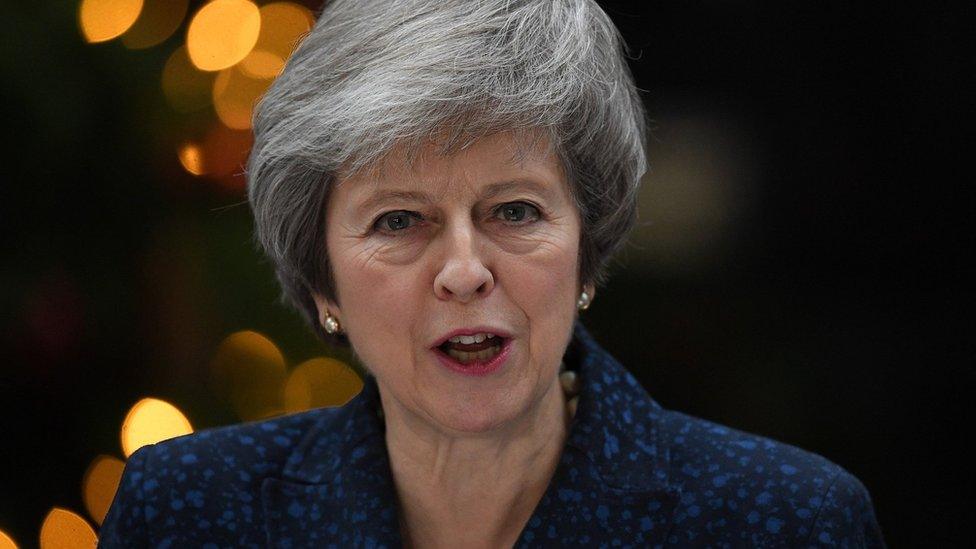Brexit: Parliament debates ahead of a vote on Prime Minister Theresa May's plan
- Published
- comments

Members of Parliament (MPs) have started to debate Theresa May's Brexit deal ahead of an important vote next week.
Mrs May's government has lost two Brexit votes in two days.
On Tuesday night, senior members of the Conservative Party showed they are not prepared to support a no-deal Brexit as they defeated the government in Parliament.
MPs backed a change (by 303 to 296 votes) to the Finance Bill, which would restrict the opportunity for tax changes following a no deal, unless it was supported by MPs.
Then, on Wednesday, MPs passed an amendment which will force the prime minister to return to parliament with a fresh plan within three days if her deal is rejected in the vote next week.
It also enables MPs to put forward their own alternative proposals, such as another referendum.
Mrs May wants Parliament to approve the deal she has created for the UK to leave the European Union (EU).
It may sound like we've been here before. That's because... we have. The vote was originally due to take place before Christmas, but it didn't happen after Mrs May admitted she was likely to lose.
MPs will be voting either to give their support to or reject two things which make up Mrs May's deal:
EU withdrawal agreement - This sets out what will happen when the UK leaves the EU on 29 March 2019 (it covers issues like how much money the UK will pay the EU in order to break away, what happens to UK citizens living elsewhere in the EU and what will happen to EU citizens living in the UK)
Accompanying political declaration - This explains what the UK's relationship will be like with the EU once a period of transition comes to an end (this is due to happen at the end of 2020)
To cancel the original vote was a big step and embarrassing for the government. It prompted many MPs in her own party to send in letters challenging her leadership.
That led to a difficult seven days for Mrs May with members of her own party saying she shouldn't carry on as prime minister.
Why did so many people disagree with Mrs May's plan in December?
The problem for Mrs May - both back in December and even now - is that there are loads of different views on the type of Brexit that people and politicians want for the UK.
She believes that the plan she's worked out is the best compromise for everyone, but lots of people are unhappy with different parts of it.
Some think it ties us too closely to the EU, but others think it will cause problems for the country to split too far from EU standards.
What different with the Brexit vote this time?
Well, that's not 100% clear.
Theresa May has said that, since the original vote (which was cancelled), the EU had agreed to some "changes" and she was continuing to talk to European leaders as she tried to give MPs the "confidence" to support the deal.
She promised a greater role for Parliament in negotiations on working out the next stage of future UK-EU relations and said she would be able to reassure people about their concerns over the Irish border backstop, which has proved an important issue regarding the vote.
WATCH: Confused about Brexit? Our expert Ross Hawkins gives you the answers
What happens now?
Theresa May has said: "I believe with every fibre of my being that the course I have set out is the right one for our country and all our people."
She has also said that she knows that the deal isn't perfect, though. "I never said this deal was perfect, it was never going to be. That is the nature of a negotiation," she said.
"We should not let the search for a perfect Brexit prevent a good Brexit."
For issues to be decided on in the House of Commons (as seen in this picture), there needs to be a majority of approval - and there doesn't appear to be a majority of approval for any outcome at the moment
The problem is that in the UK Parliament, for issues to be decided on, there needs to be a majority of approval - and there doesn't appear to be a majority of approval for any outcome at the moment, including the deal that is currently on the table.
We don't know what is going to happen at the vote next week or indeed with any possible changes to the current deal.
But one thing we do know is that if MPs do vote against the Brexit deal, Mrs May and her government will be in a very tricky position.
- Published15 January 2019
- Published11 January 2019
- Published28 November 2018
